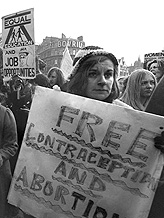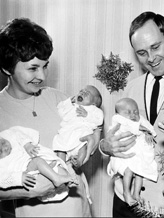Christiaan Barnard, who performed the world's first heart transplant in 1968 (image right). Find out more below
1960 - first UK kidney transplant
The first UK transplant takes place at Edinburgh Royal Infirmary on October 30 1960 and involves an identical set of 49-year-old twins. The procedure is a success, with both donor and recipient living for a further six years before dying of an unrelated illness.
Kidney transplants, which for many are a welcome alternative to a lifetime of regular dialysis, now have a very high success rate, but demand outstrips supply due to an ageing population. This means there is an increased incidence of renal failure, while the number of donor organs available has fallen.
1961 - the contraceptive pill is made widely available

The launch of the contraceptive pill, which suppresses fertility with either progestogen or oestrogen or, more commonly, a combination of both, plays a major role in women’s liberation and contributes to the sexual freedom of the so-called Swinging Sixties. Initially, it is only available to married women, but the law is relaxed in 1967.
Between 1962 and 1969, the number of women taking the pill rises dramatically, from approximately 50,000 to 1 million.
1962 - Enoch Powell's Hospital Plan
The medical profession criticises the separation of the NHS into three parts – hospitals, general practice and local health authorities – and calls for unification. The Hospital Plan approves the development of district general hospitals for population areas of about 125,000 and, in doing so, lays out a pattern for the future. The 10-year programme is new territory for the NHS and it soon becomes clear that it has underestimated the cost and time it would take to build new hospitals. However, a start is made and, with the advent of postgraduate education centres, nurses and doctors will be given a better future.
1962 - first full hip replacement is carried out by Professor John Charnely
Charnley begins to devote his energies to developing full hip replacements from 1958 and moves his practice to the Wrightington Hospital, where the first full hip replacement will take place. He asked his patients if they minded giving back the hip post-mortem. Apparently, 99% of them agreed, so his team would regularly collect the replacement hips to check wear and tear, and aid research. He improved his design, with a low-friction hip replacement, and in November 1962, the modified Charnley hip replacement became a practical reality.
1967 - Salmon Report
The Salmon Report is published and sets out recommendations for developing the nursing staff structure and the status of the profession in hospital management. The Cogwheel Report considers the organisation of doctors in hospitals and proposes speciality groupings. It also highlights the efforts being made to reduce the disadvantages of the three-part NHS structure – hospitals, general practice and local health authorities – acknowledging the complexity of the NHS and the importance of change to meet future needs.
1967 - Abortion Act
The Abortion Act is introduced by the Liberal MP David Steel and is passed on a free vote on October 27 1967, becoming law on April 27 1968. It makes abortion legal up to 28 weeks if carried out by a registered physician and if two other doctors agree that the termination is in the best mental and physical interests of the woman. In 1990, the time limit is lowered to 24 weeks. The act does not extend to Northern Ireland.
The legalisation of abortion opens a major public debate, which continues today.
1968 - Britain's first heart transplant
South African-born surgeon Donald Ross carries out Britain’s first heart transplant at the National Heart Hospital in Marylebone, London, on May 3 1968.
Ross leads a team of 18 doctors and nurses to operate on the unnamed 45-year-old man in the seven-hour procedure. The donor was a 26-year-old labourer called Patrick Ryan. The British operation is the tenth heart transplant to be undertaken in the world since Christiaan Barnard carried out the first in Cape Town, South Africa, in December 1967. The patient dies after 46 days from an associated infection and only six transplants are carried out over the next 10 years for fear of failure.
1968 - British woman gives birth to sextuplets after fertility treatment
 On the morning of October 2, Sheila Thorns celebrates her 30th birthday by undergoing a caesarean section at Birmingham Maternity Hospital. With 28 medical staff at the delivery, she gives birth to six babies, four girls and two boys, but one of the girls dies shortly afterwards. The five surviving babies are cared for by a specialist team, though two more later die. Doctors say around one birth in 3,000 million will result in sextuplets. Mrs Thorns had been treated with the fertility treatment gonadotrophin, which contains two hormones known as FSH and LH.
On the morning of October 2, Sheila Thorns celebrates her 30th birthday by undergoing a caesarean section at Birmingham Maternity Hospital. With 28 medical staff at the delivery, she gives birth to six babies, four girls and two boys, but one of the girls dies shortly afterwards. The five surviving babies are cared for by a specialist team, though two more later die. Doctors say around one birth in 3,000 million will result in sextuplets. Mrs Thorns had been treated with the fertility treatment gonadotrophin, which contains two hormones known as FSH and LH.